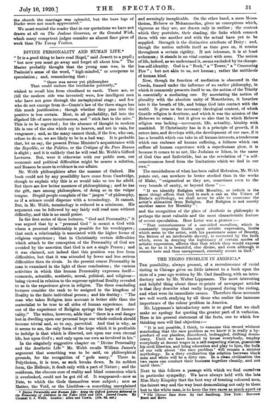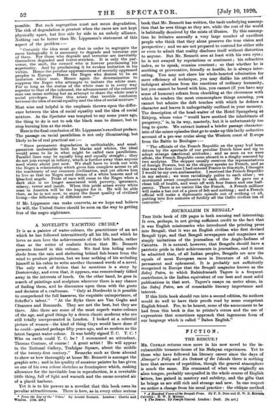THE NEGRO PROBLEM IN AMERICA.* TEE possibility, always present, of
a recrudescence of racial rioting in Chicago gives no little interest to a book upon the riots of a year ago written by Mr. Carl Sandburg, with an intro- ductory note by Mr. Walter Lippmann. The most interesting and helpful thing about these re-prints of newspaper articles is that they describe what really happened during the rioting, and what were its immediate causes. Therefore these accounts are well worth studying by all those who realize the immense importance of the colour problem in America.
Mr. Lippraann's introductory note is so good that we shall make no apology for quoting the greater part of it verbatim. Here is his general statement of the facts, one to which few thinking men will find objection :—
" It is not possible, I think, to examine this record without concluding that the race problem as we know it is really a by- product of our planless, disordered, bedraggled, drifting demo- cracy. Until we have learned to hewn everybody, employ everybody at decent wages in a self-respecting status, guarantee his civil liberties, and bring education and play to him, the bulk of our talk about 'the race problem' will remain a sinister mythology. In a dirty civilization the relation between black men and white will be a dirty one. In a clean civilization the two races can conduct their business together cleanly, and not until then."
Next to this follows a passage with which we find ourselves in particular sympathy. We have always held with the late Miss Maly Kingsley that the best way of treating coloured men, the fairest way and the way least demoralizing not only to them but to the whit() man, is to keep the two races as much apart as • The Chwago Race Riots. By Carl 8=W:wag. -Hew York: Hareour$ B r a ce and Rowe.
possible. But such segregation must not mean degradation. The risk of degradation is greatest when the races are not kept physically apart, but live side by side in an unholy alliance. Nothing can be better than Mr. Lippmann's statement of this aspect of the problem :—
"Certainly the idea must go that in order to segregate the races biologically it is necessary to degrade and terrorize one of them. For those who degrade and terrorize are inevitably themselves degraded and terror-stricken. It is only the par- venue, the snob, the coward who is forever proclaiming his superiority. And by proclaiming it he evokes imitation in his victim. Hence the peculiar oppressiveness of recently oppressed peoples in Europe. Hence the Negro who desires to be an imitation white man. Hence again the determination to suppress the Negro who attempts to imitate the white man. For so long as the status of the white man is in every way superior to that of the coloured, the advancement of the coloured man can mean nothing but an attempt to share the white man's social privileges. From this arises that terrible confusion between the idea of social equality and the idea of social mixture."
Most wise and helpful is the emphasis thrown upon the differ- ence between the idea of social equality and the idea of social
mixture. As the Spectator was tempted to say some years ago, the thing to do is not to ask the black man to dinner, but to
stop burning him at the stake.
Here is the final conclusion of Mr. Lippmann's excellent preface. The passage on racial parallelism is not only illuminating, but likely to be of real practical use :—
" Since permanent degradation is unthinkable, and amal- gamation undesirable both for blacks and whites, the ideal would seem to lie in what might be called race parallelism. Parallel lines may be equally long and equally straight ; they do not join except in infinity, which is further away than anyone need worry about just now. We shall have to work out with the Negro a relationship which gives him complete access to all the machinery of our common civilization, and yet allows him to live so that no Negro need dream of a white heaven and of )leached angels. Pride of race will come to the Negro when a dark skin is no longer associated with poverty, ignorance, misery, terror and insult. When this pride arises every white man in America will be the happier for it. He will be able then, as he is not now, to enjoy the finest quality of civilized living—the fellowship of different men."
If Mr. Lippmann can make converts, as we hope and believe he will, the United States should be soon on the way to getting
free of the negro nightmare.



































 Previous page
Previous page